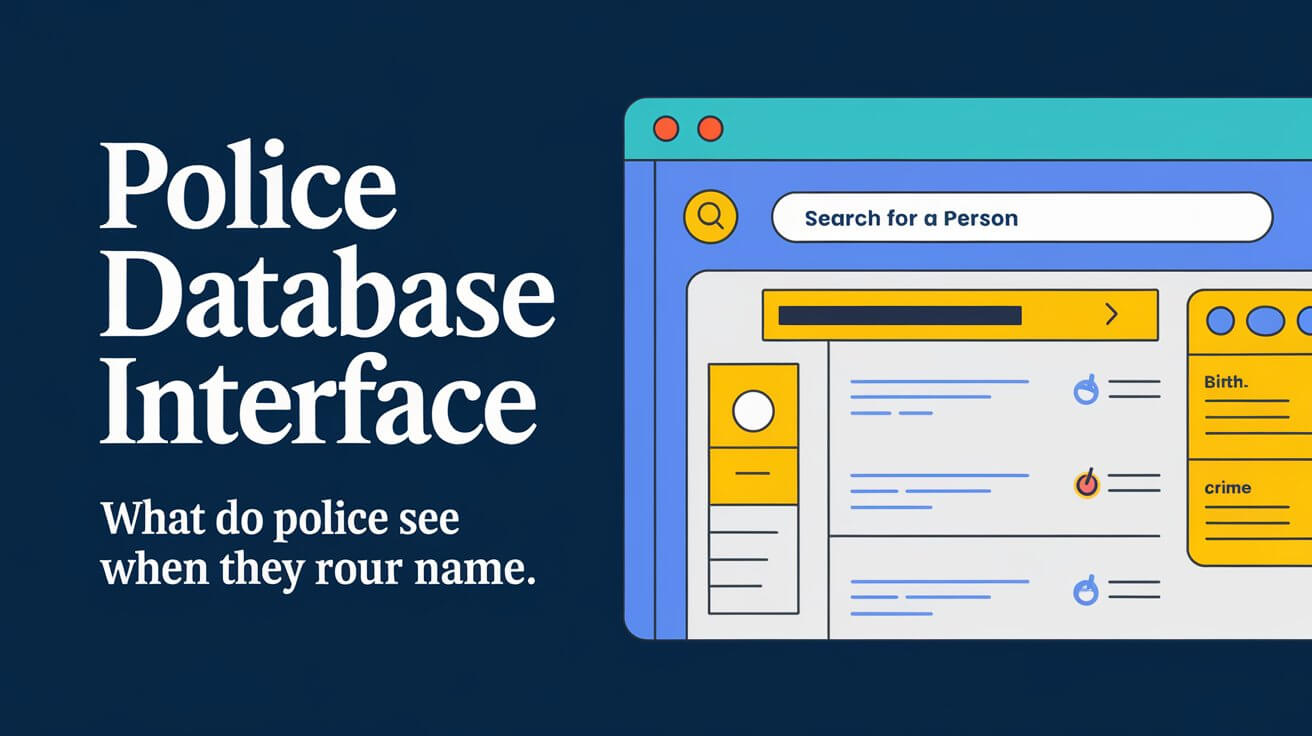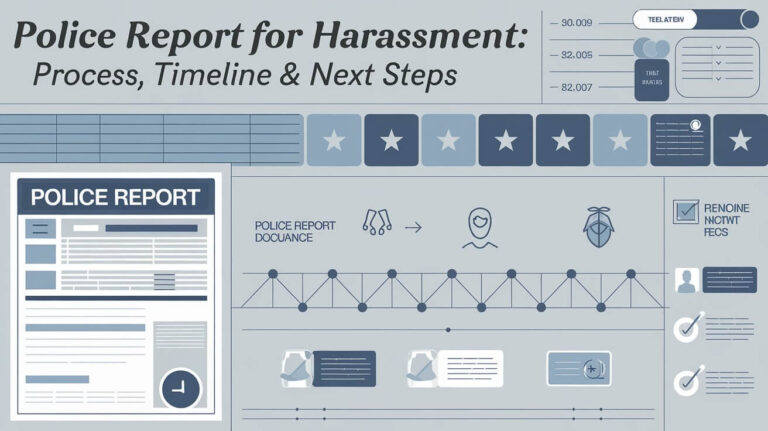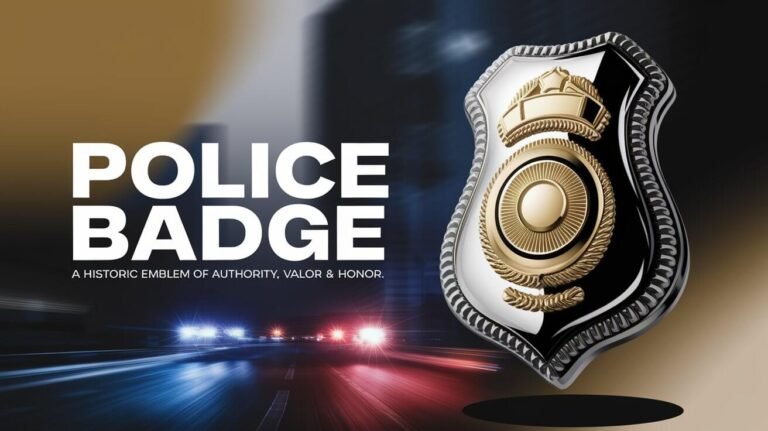What Do Police See When They Run Your Name

Running a name through police databases reveals extensive personal details. Police officers access multiple systems to check everything from basic identity to criminal records. Let’s look at exactly what information appears when officers run your name.
Police Database Access and Information Systems
Law enforcement relies on five main databases for checking names and gathering information. These databases connect to local, state, and federal records for instant access during traffic stops and other encounters.
Main Law Enforcement Databases
The Department of Motor Vehicles (DMV) provides vehicle registration and driving records. Police access this instantly to confirm vehicle ownership and check for violations. Officers also use the local police records system and the National Crime Information Center (NCIC) database.
How Police Access Your Information
Most departments now use modern computer systems in patrol cars for quick database searches. Officers enter names through Windows-based software or mobile computers. Some departments still use older text-based systems that work like library catalogs.
Real-Time Data Sharing Between Agencies
Police departments share data across jurisdictions through connected systems. This helps catch criminals who cross state lines. The NCIC database pulls information from local, state and federal files into one searchable system.
Personal Information Revealed in a Name Check
A police name check shows detailed personal data from multiple sources. This helps officers confirm identity and check for potential issues.
Basic Identity Details
When running your name, police see:
- Full legal name and any aliases
- Date of birth
- Social Security number
- Current home address
- Previous addresses
Physical Descriptors and Biometric Data
Officers can view your:
- Height and weight
- Eye and skin color
- Vision information
- Gender
- Identifying marks or scars
- Tattoo descriptions
- Fingerprints if in the system
Current and Previous Addresses
Address history helps police:
- Verify your current residence
- Track movement between jurisdictions
- Find people with outstanding warrants
- Identify false information
Driving and Vehicle Records
Vehicle and driving records appear automatically during name checks. This gives officers a complete picture of your driving history.
License Status and Driving History
Police instantly see:
- Driver’s license number
- License status (valid, suspended, revoked)
- License expiration date
- Driving restrictions or conditions
- Past license suspensions
Vehicle Registration Details
Officers access:
- Vehicles registered in your name
- Make, model and year
- License plate numbers
- Vehicle identification numbers (VIN)
- Registration status and expiration
Traffic Violations and Citations
Your complete driving record shows:
- Moving violations
- Parking tickets
- Traffic accidents
- Citations and fines
- Points on license
- Past license suspensions
Insurance Information
Police check if you have:
- Current auto insurance
- Past insurance lapses
- Required SR-22 insurance
- Insurance violations
Criminal History and Legal Records
Name checks reveal your full criminal record and current legal status. This helps officers identify risks and outstanding issues.
Past Arrests and Convictions
Officers see details of:
- Previous arrests
- Criminal charges
- Court appearances
- Conviction records
- Jail or prison time
- Release dates
Outstanding Warrants
The system flags:
- Active arrest warrants
- Bench warrants
- Out-of-state warrants
- Failure to appear
- Unpaid fines
- Probation violations
Probation or Parole Status
Police can view:
- Current supervision status
- Probation conditions
- Parole restrictions
- Reporting requirements
- Violations
- Supervision officer contact
Protective Orders and Restraining Orders
Name checks show:
- Active protection orders
- Restraining order details
- No-contact orders
- Order violations
- Court dates
- Protected person information
Additional Records Police Can Access
Police databases contain other relevant records beyond criminal and driving history. This extra information helps investigations and public safety.
Firearms Registration and Permits
Officers see:
- Registered firearms
- Concealed carry permits
- Permit restrictions
- Past permit denials
- Firearm violations
Immigration Status
Databases may show:
- Immigration status
- Visa information
- Travel restrictions
- ICE detainers
- Deportation orders
Missing Persons Database Matches
Police check if names match:
- Missing persons reports
- Amber Alerts
- Silver Alerts
- Unidentified persons
- Cold case files
Known Associates and Gang Affiliations
Records may include:
- Known criminal associates
- Gang membership
- Gang activity
- Territory information
- Related investigations
Privacy and Legal Rights
Laws protect your privacy while allowing necessary police access to records. You have rights regarding your information.
Limits on Police Information Access
Police must follow rules about:
- Reasonable suspicion
- Probable cause
- Search warrants
- Information sharing
- Record retention
Your Rights During Police Encounters
You have the right to:
- Remain silent
- Refuse searches
- Request an attorney
- File complaints
- See your records
- Correct errors
Data Protection Laws
Laws regulate:
- Information collection
- Data storage
- Record sharing
- Access restrictions
- Privacy protection
- Data disposal
Challenging Incorrect Information
You can:
- Request record copies
- Report errors
- File corrections
- Appeal decisions
- Seek legal help
- Clear old records
Common Questions About Police Name Checks
People often wonder about specific aspects of police name checks. Here are key details about the process.
Time Frame for Information Display
Most records show:
- Current active warrants
- Recent criminal history
- Past 3-7 years of driving records
- Active court cases
- Current registration status
Differences Between State Systems
Each state has:
- Unique database systems
- Different retention periods
- Varied access rules
- State-specific laws
- Local regulations
Information Accuracy and Updates
Database accuracy depends on:
- Regular updates
- Agency reporting
- Court input
- DMV records
- Local procedures
False Matches and Identity Confusion
Problems can occur from:
- Similar names
- Stolen identity
- Data entry errors
- Outdated information
- Missing updates
Police access to personal information serves public safety while following privacy laws. Officers see extensive records when running names, but rules protect your rights. Knowing what appears in police databases helps you understand these important systems.
Remember that police must have legitimate reasons to run your name. They cannot access records for personal use or harassment. If you believe your rights were violated, seek legal help to protect your privacy and correct any issues.






